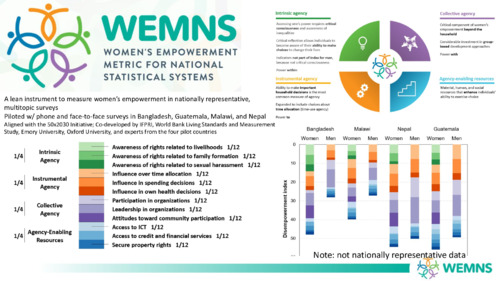Women's Empowement Metric for National Statistical Systems (WEMNS): A lean instrument to measure women’s empowerment in nationally representative, multitopic surveys
Abstract
Monitoring progress toward SDG 5—achieving gender equality and empowering all women and girls— remains challenging without incorporating women’s empowerment metrics into nationally representative and multitopic surveys. To address this problem, we designed the Women’s Empowerment Metric for National Statistical Systems (WEMNS) as a short empowerment module for the 50×2030 Initiative, a global partnership that aims to build capacity and close the agricultural data gap in 50 countries by 2030. We aimed to design a measure of women’s and men’s empowerment in urban and rural areas, with the flexibility to be relevant to a variety of livelihood strategies across countries in different stages of rural and structural transformation (e.g., farming, wage labor). WEMNS is a multidimensional index composed of four domains—intrinsic agency, instrumental agency, collective agency, and agency-enabling resources— measured by binary indicators. In this paper we describe the development and validation of the WEMNS index using the Alkire-Foster approach, including: (1) WEMNS’s distinctiveness from other empowerment metrics, (2) the iterative approach to the development and piloting of WEMNS in Bangladesh, Guatemala, Malawi, and Nepal, using cognitive interviewing, phone surveys, and face-to-face surveys, (3) analysis of quantitative pilot data, including intrahousehold patterns of empowerment/disempowerment, and (4) a summary of the findings from the qualitative work. The paper concludes with a discussion of lessons learned and possibilities for further development of empowerment metrics.

